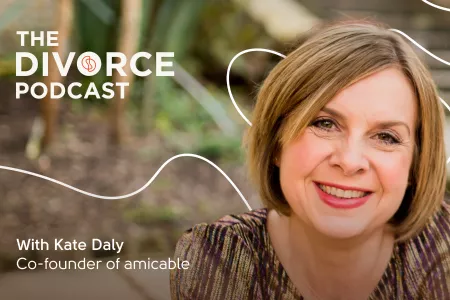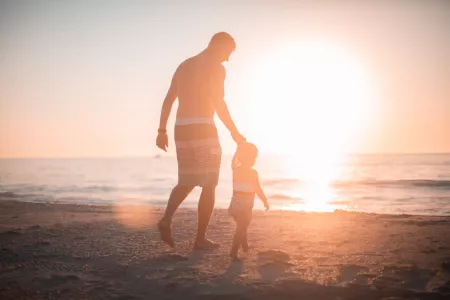Healing from divorce and the healing curve
Divorce is commonly accepted now as one of the most traumatic experiences you may have in life. I know it certainly was for me. The first few months after my separation were incredibly challenging – I lost two stone in six weeks, stopped sleeping properly, couldn’t really eat, and spent many hours ruminating on what I could have done differently to avoid this.
Whether it was your decision to divorce or not, there is a grieving process to go through. I prefer to call it a healing process, as that feels somehow more focused on the future.
The process of healing from divorce will be different for everyone.
'As you go through your divorce, you may grieve all sorts of things – perhaps the loss of your spouse, the loss of the life you thought you had, the loss of your nuclear family, a sense of loss of self.'
In 1969, psychologist Elizabeth Kubler-Ross set out five stages of grief in her work around bereavement and dying. As you read these, perhaps you will recognise the different stages.
Stages of healing after divorce
Denial
Perhaps you’re thinking ‘This isn’t happening’ or ‘When I wake up tomorrow, it will all be OK’.
You feel shocked and uncertain. Denial and shock are how your brain reacts to protect you from the pain of a reality you aren’t yet ready for. It helps you not to feel so overwhelmed, by refusing to believe what is happening.
Anger
This stage might sound like ‘How dare he/she do that?’ or ‘She/he is such a...'
Friends may join you in your anger and encourage you to do things that are out of character. Anger is full of energy and this is when you’re perhaps most likely to do or say something you may later regret.
Bargaining
In this stage, you might try to negotiate with yourself, with the universe, or with your ex. You might think ‘if only I had been more attentive /sexier/funnier, this might not be happening’, or perhaps ‘If I had only done something earlier, perhaps we could have avoided all this’.
Depression
This is when you just don’t want to get out of bed, perhaps you find yourself crying a lot, and feeling totally lacking in energy, thinking ‘I can’t face this’.
Acceptance
When you reach acceptance, you might think ‘That happened, but I’m OK’ or ‘It was sad that we got divorced, but I feel hopeful for the future’.
It doesn’t necessarily mean that you are happy about your divorce, or that you have ‘got over it’ and forgotten it. It does mean that you can live with it, you can look forward, and start to create a new future that suits you. You might find yourself noticing all the things you’ve learnt, and how you’ve grown as a result of your divorce.
These stages are not linear, and you probably won’t glide smoothly from one to the next. Instead, they can be messy and confusing and it might feel like you’re on a roller coaster. You might feel sad one minute, and then something happens to bring anger to the fore. You might find that you feel at peace one day, but full of bargaining thoughts the next.
Healing from divorce - 3 tips to help you as you move through your healing process:
Tip 1: Notice where you are right now
- Take a moment to think about the different stages and identify where you feel you are right now
- Where do you feel you were yesterday? Last week?
- What do you notice about how you are moving through the different stages?
Tip 2: Break your state
If you find yourself stuck in a funk, feeling that you can’t change how you feel, here are some simple strategies to shift your energy fast:
- Do some star jumps
- Shake your whole body and stretch up really tall
- Change your clothes and wear something that you KNOW makes you feel great
- Listen to a really uplifting song, really loudly
- Take some time out to listen to a [meditation](https://amicable.io/mindfulness-activities-to-help-during-divorce-and-separation)
- Go for a walk in the sunshine or do some yoga
Tip 3: Ask yourself positive questions
It can be easy to get stuck wondering why, and in a negative spiral of thinking. So ask yourself great questions:
- What would be the most helpful thought I could have right now?
- Who would be the best person to help me with this?
- What has happened today that was good?
- What advice might my closest friend give me right now?
- What one thing always lifts my mood?
Remind yourself that this will pass. Be kind to yourself as you move through these stages of healing.
FAQs
How long does it take to heal from divorce?
The time it takes to heal from a divorce varies from person to person, and there is no one-size-fits-all answer. Healing from divorce is a highly individualised process, and it can depend on various factors, including the nature of the marriage, the circumstances of the divorce, and the emotional resilience of the individuals involved.
Why is healing from divorce trauma difficult?
Healing from divorce trauma can be challenging for many different reasons including feelings of guilt, shame, and low self-esteem, social stigmas that add to the emotional burden and make it difficult to seek support, and the sense of failure can be a significant barrier to healing from divorce.
How do you heal from a divorce that you didn’t want?
Knowing how to heal from a divorce that you didn't want can be particularly challenging because it often involves a sense of loss, rejection, and the feeling of being out of control. While the process of healing from divorce is unique to each individual, seeking emotional support from your loved ones, focusing on self-care and if necessary, seeking professional help through therapy or counselling, can all help you overcome these feelings and emotions.
Read More

We’ve written down some simple mindfulness tools, with the support of the therapists at Spill, to help you re-centre when you’re going through a divorce or separation. If you’re able to carve out some time to tend to your mental health you will reap the rewards in the long term.

The podcast is hosted by Kate Daly, Co-founder of amicable. Kate talks with a variety of guests from experts to celebrities about divorce, separation and co-parenting and is full of tips, tools and advice. It’s available on all your favourite listening platforms.

The end of a relationship marks the end of your journey with that other person and, instigator or not, dealing with the fallout and moving on is tough. There are things you can do that’ll help you cope with separation in order to find a path forward towards a life that not only do you want, but you deserve.

Start your amicable divorce journey
Speak to an amicable Divorce Specialist to understand your options and next steps for untying the knot, amicably.
Your guide to a kinder divorce
What if divorce didn’t have to be a battle?
In amicable divorce, Kate Daly offers compassionate, practical guidance to help you separate in a kinder, better way. Whether you’re just beginning, working through the practicalities or adjusting to co-parenting, this book meets you exactly where you are - and helps you move forward with confidence.
Pre-order on Amazon today
.webp)





Comments (2)
Not discussed yet, as daughter mid A-Levels
Hi Emma, Thank you for your comment. If you're ready to discuss the process and hear a little bit more about amicable's services, please book a free consultation here: calendly.com/d/crj-93m-rp4 Best wishes, Oscar from amicable